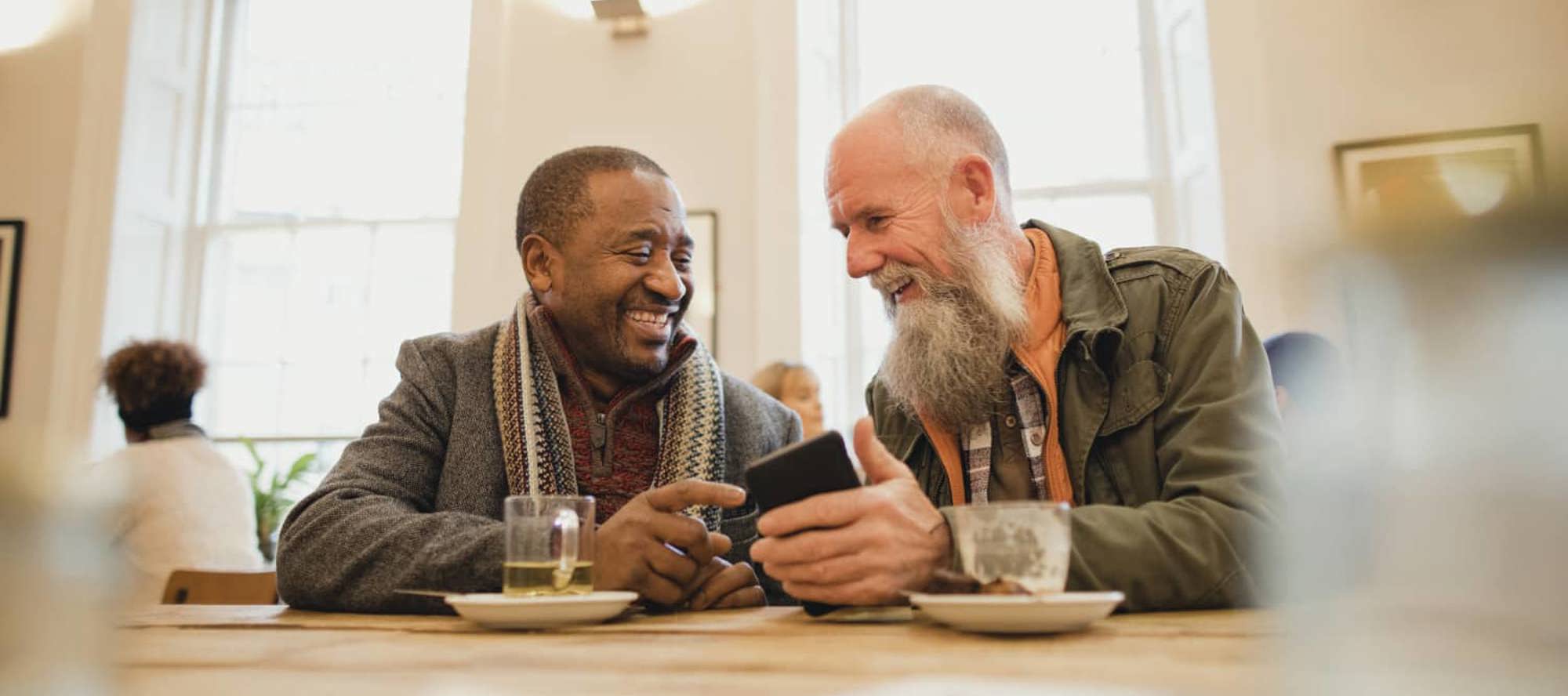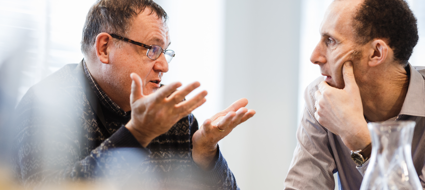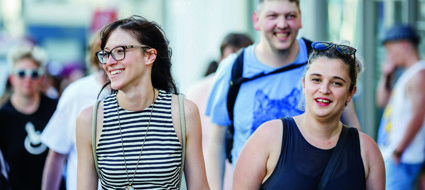Working together, learning together: A lived experience guide to co-production
Published:
This podcast considers co-production, how the discussion around it is still quite theoretical, and what it really means for people with lived experience of services and practitioners.
Claire Williams, Research and Development Officer at Research in Practice, speaks to Clenton Farquharson. Clenton is Chair of Think Local Act Personal Partnership board, a Trustee of the race equality foundation, an Ambassador for disability rights and he has lived experience of social care services.
They talk about co-production and how the discussion around it is still quite theoretical. Clenton explains how it can work in organisations, and what it really means for people with lived experience of services and practitioners.
[Introduction]
This is a Research in Practice podcast, supporting evidence-informed practice with children and families, young people and adults.
Claire: Hi everyone, I'm Claire from Research in Practice. I'm a research and development officer. I have led on the Involving People topic for 2020-2021 programme and this has included various resources such as the strategic brief on ‘Co-Production and Strength-Based Working.’ This briefing had some key messages for leaders and managers and it talked a lot about the theory and how managers and leaders can create a culture and encourage co-production within their organisations. So, we hear a lot about co-production in our sector, but I feel, and I'm sure many people do, that the discussion is still quite theoretical, and I'd like to know a bit more about how it can work in organisations and especially for people with lived experience of services. So, today I'm talking to Clenton Farquharson who is our expert in co-production. He's going to help us to get to the bottom of what co-production is. So, we'll have a little think about some of the challenges and how they can be overcome, with a bit of focus, maybe, on how practitioners can work with people that they're supporting to think about where there are opportunities to use co-production. And Clenton has a very impressive CV. He is the chair of the Think Local Act Personal partnership board, he's a trustee of the Race Equality Foundation, he's an ambassador for disability rights and he also has lived experience of Social Care services, amongst various other accolades. So, hello Clenton, welcome, how are you today?
Clenton: I'm great, thank you Claire. Thank you for that massive introduction, thank you.
[Clenton’s introduction]
Claire: Oh very good. So, can you tell us a little bit about your background in this area and why co-production is important to you?
Clenton: My background in this area, as I describe myself as a black disabled person who uses Health and Social Care and I employ my own personal assistant and I basically stumbled across what we call co-production and personalisation and I stumbled across it through what I call the two tribes. And the tribes are NHS Health England and Social Care, because both talk in different languages so to speak. So, I initially assumed everything was in place for disabled people, and this is basically my journey. I realised co-production isn't just about, like you introduced, about the theory, which I call the head. How do we connect the head and the heart to the actual doing, the hands bit, the practitioner level? And that's what I try to do.
[What is co-production?]
Claire: Brilliant, okay. So, as you say, we've got a lot of information on the theory, like in our strategic briefing, which we'll share, you know, useful for leaders and managers to get them thinking about the benefits of co-production. But how would you explain what co-production is in really basic terms? And I've got a second part to that question, which is, do you like the term co-production?
Clenton: Ooh. Okay. We'll start with the term co-production. I think to be honest, co-production the term is quite 'jargonistic' and in plain language it's not really easy to describe. How I'd describe co-production, and this is how my brain works, I describe it is 'working together, learning together'. That's how I describe co-production. Because we can all learn from each other. I hope that answers your question. And for me, the issue of how I talk about co-production is together is better. Alone is harder, and what I mean is, this is part of the culture of what we've created in Health and Social Care of people doing to you and for you. What co-production is trying to do is introduce the lens of doing with and alongside, if that makes sense.
[Clenton’s analogy for co-production]
Claire: Yes, exactly. When we spoke previously, you mentioned the song by Salt-N-Pepa. I wondered if you could just share that lovely analogy with people listening.
Clenton: Okay. I thought you'd forgotten about that. Yes, but the analogy that I use, because I think we need to engage with dialogue what co-production isn't, if that makes sense. And I use this analogy, and I love music and when I was trying to describe what co-production isn't, it reminded me of the song by Salt-N-Pepa. And the first line talks about, 'Let's talk about sex.' And I'll tell you why and what that means. And that means to me often people talk about co-production is like teenage sex. Everyone talks about it, but nobody really knows how to do it, everyone thinks everyone else is doing it, so everyone claims they are doing it. So, that's how I describe, because everyone says, 'Oh yes, I'm doing co-production,' you know, and when they start digging deeper, you realise, no.
Claire: I really like that, love it. Yes, so we have talked a little bit about, when we chatted last time, these three levels of co-production and I wondered if you could explain to everyone what they are.
[Personalisation and co-production]
Clenton: Yes, I can explain those levels. But I just want to try and put that into context and talk a bit about personalisation because personalisation, for me, fits hand in glove with co-production, and there are seven principles when I'm talking about personalisation. The first one lends itself to co-production through ‘nothing about me without me’. And that lends itself from the disability movement. So, co-production and personalisation, you know, you can't do just to and for people, you have to do with and alongside. But also, to remember, everyone is unique, that's a fundamental principle for me in co-production and personalisation. And the third one I would talk about are the principles how you communicate and interact with people impacts on our self-worth, dignity, aspirations, opportunities to live their life. The other principle, the one I talk about is, everyone can do something to achieve personalisation, however little. And remember, little things can make a big difference in personalisation. We always look for this transformational change, big bang theory, but little things can make a big difference. And also, the principle that we all are equal and deserve mutual respect and all have skills, knowledge and experience that we can bring to the discussion.
Okay, so what I actually mean by that is, to move away from just having insider conversations to bringing outsiders in who can bring in a different perspective. And then my last principle is empowerment works both ways. So, it's not about trying to empower people who use services, it's also about empowering practitioners and the workforce. So, remember them as the core elements of personalisation and co-production. And one of the guiding, or ‘North Stars’ for me on this is, if you stick to the convenient, you will never find the unexpected. That's what co-production is. Co-production is a way of opening up dialogue, not debate. Debate is framed as wrong and right. So you end up having more heated arguments. But if you frame it as dialogue, that's a different, you know, lens and frame of meeting of the minds, if that makes sense.
[The three levels of co-production]
Claire: Yes, it does. That's really good.
Clenton: When I talk about co-production and the three levels. I'm coming from, first, the individual level. Which is one to one. That's the most, I'd call it, a basic level that me and you are doing at the moment. We're having a dialogue. In adult social care, that individual dialogue is normally set and framed around care and supporter care and support plans. You know, depending on where you are along that line. Then you've got an organisational structure. And what I mean by organisational structure, that is in the form and function of how certain activities are directed in order to achieve the goal of the organisation. In this case of adult social care, through activities that can include rules that the organisation puts up. The roles that the organisation does and also the responsibility. But then, thinking about the functional structure, which ultimately influences the relationship between management and the workforce and how communication flows, where responsibility falls and the conditions that enable the culture of co-production, what I call, to thrive. And we need to remember the good news, for me, and it is good news, that structures aren't written in stone. They're easily tweaked or altered as organisations grow or adapt with time. And that's done through co-production. It reminds me of it's not the strong that survive, it's the most adaptable to the changing times. And if you think about where we are right now, we're living through the most exceptional circumstances and times right now and we need co-production more, not less.
Claire: Definitely agree with that.
Clenton: The third element, I would say, I call that ‘systems’, or ‘community’, and what I mean by systems is addressing root causes of social problems which are often hard to control, and embedded in networks of how people live their lives. And how the external factors, such as social inequality, structural racism or underfunded support services play out. And that's where health, social care, housing, or public services play out. And it's understanding how we plan those processes and design those processes, fundamentally alter the components and structure for how people behave in that workforce in certain ways. So for me, again, and many of us, co-production can play a massive role. And it's a long term relationship.
[Co-producing care and support]
Claire: And you can see how all those three levels, if you call them that, really are intrinsically connected. For that sort of structural change, you need that, kind of, individual involvement. So, do you have any thoughts or tips you can share with us around how practitioners can help people that they're supporting to understand co-production, you know, in the development of their care and support plans on really basic terms?
Clenton: In the basic terms, at an individual level, at a one-to-one level, when we're talking about care and support plans, the basic conversation for me should be framed around aspirations, wishes, dreams and we've got tools. We've got many tools that can do that. Sometimes called person-centred approaches, person-centred thinking or even, you know, person-centred planning. But they're all tools that can enable and facilitate practitioners to pull out what matters most to the individual. And the three words that I try and describe person-centred, because that could be see seen as jargon, person-centred, you know? And I'll say three words which are, ask what matters most to the individual, listen to what matters most to the individual and then do what matters most to the individual from your conversation. That's a person-centred care to me. But if you want to go into the theory, there's plenty of theory around. That's just a practical level that practitioners can sort of use in a very simplistic way to try and elicit how they build that foundation of what matters to the individual they're talking to and build that wellbeing that enables them to live a life.
[Final thoughts: the role of practitioners]
Claire: It’s been very lovely to speak to you, Clenton. Lots of really brilliant things to think about for practitioners and people with lived experiences services and managers and leaders as well. Lots of really important messages there. Any other things you would like to mention before we sign off for today?
Clenton: I just think one of the things that we need to help practitioners is about exploring what vulnerability, the power of vulnerability. One of the things I must say, practitioners in this pandemic have been doing their best. We thank you all for doing what you do, you know? And what we would hope that back at the ranch, for a better term, you are supported to enable to refuel yourself to give your best. Again and one of the biggest issues is how we use curiosity. How do we make sure the curiosity of a fellow human being? Because sometimes that can get lost because of all the transactional elements of filling in paperwork. You know, we forget that it could be a human at the end of that discussion. And that's why, for me, when I talk about social care, to me it can change a life and, I guess, save my life. The hard work and hard yardage were done by practitioners supporting to enable me, educating and helping me to be aware and empowering me to do what I'm doing now. So I've got a lot to say thank you to practitioners.
Claire: Lovely. And I suppose that was all the things that were co-produced with yourself?
Clenton: Exactly.
Claire: Brilliant. Lovely. Thank you so much, Clenton.
[Outro]
Thanks for listening to this research and practice podcast. We hope you've enjoyed it. Why not share with your colleagues and let us know your thoughts on Twitter? Tweet us @ResearchIP.
Talking Points
Clenton and Claire discussed:
- The seven levels of personalisation and how they fit ‘hand in glove’ with co-production.
- The three levels of co-production – individual, organisational and systemic.
- The individual level – how co-production can be used for care and support planning.
- The power of vulnerability and being curious.
Resources mentioned in this podcast
- Sutton, J. (2020) Co-production and strengths-based practice: Leaders' Briefing (2020) Dartington: Research in Practice.
- Person centred practice:
- Guthrie L. (2018).Person-centred approaches to adult mental health: Frontline Briefing Dartington: Research in Practice.
- Podcast Person-centred approaches to adult mental health. Dartington: Research in Practice.
- Professional curiosity:
- Thacker H, Anka A & Penhale B. (2020). Professional curiosity in safeguarding adults: Strategic Briefing Dartington: Research in Practice.
Reflective questions
Here are some reflective questions to stimulate conversation and support practice.
- Do you/ your organisation use co-production?
- What are the key facilitators and barriers for you/ your organisation in using co-production with the people you support? How might you address these barriers?
- What are the key messages from this podcast that you might take forward in your organisation or team?
Professional Standards
PQS:KSS - Safeguarding | Person-centred practice | Direct work with individuals and families | Effective assessments and outcome based support planning | Organisational context | Supervision, critical analysis and reflection | Developing confident and capable social workers | Promoting and supporting critical analysis and decision-making | Relationship-based practice supervision | Values and ethics | Assuring good social work practice and development
CQC - Caring | Effective
PCF - Diversity and equality | Rights, justice and economic wellbeing | Critical reflection and analysis | Contexts and organisations | Values and ethics
RCOT - Understanding relationship | Service users | Communication | Collaborative | Identify needs




